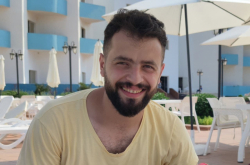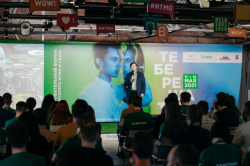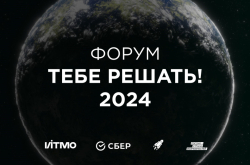A total of 80 teams, all students of the course Fundamentals of Conceptual Thinking, took part in the competition. From September till December, the students learned to collect and process information on a given problem and use this data to develop digital products that would solve it. At the end of the course, students could practice these competencies while working alongside ITMO’s major industrial partner, Sberbank. Students could choose to do the course in Russian or English.
“Following the completion of the course, student teams present product ideas that took months to develop. Before that stage, each project was evaluated by creative experts; thanks to Sberbank, we were able to engage specialists with inside knowledge of the digital tech market. The goal of the competition is to demonstrate the benefits of conceptual thinking and the way it can produce breakthroughs, as well as why it’s so valued among Sberbank staff. Additionally, by engaging with the experts, students can see that they are moving in the right direction and receive support,” shares Natalia Bystryantseva, PhD, the head of the course and an associate professor at ITMO.
The competition kicked off with a three-hour intensive workshop by experts from Sberbank and the marketing agency Friends Moscow. There, speakers discussed creative approaches to digital product development, as well as presented the Sberbank products that would be used in student projects: GigaChat, Salute, Cloud.ru, Geoanalytics, and two fintech services. After the workshops, the experts held individual consultations with each team. The day concluded with teams submitting one-page descriptions of their ideas.
In the final stage, all 80 projects were evaluated by Sberbank’s specialists, with the five most promising projects selected as winners. Whereas last year, finalists had to present a design prototype of their idea, this year, they defended concepts of digital solutions (this change was made due to a shorter competition timeframe). The winning teams will be assisted in developing their products and reaching out to experts, investors, and consultants.
In their evaluation, experts primarily considered the relevance and accuracy of the identified user problem, the chosen solution strategy, and the feasibility of launching the product on the market. The five winners received recommendations from the company’s experts on potential partners and investors, as well as how to correctly conceptualize their endgoal, which technologies to apply in the development, and the necessary steps towards a prototype.
“All winners have accurately identified the user needs of their projects, which is a key factor for a business. However, the market is overflowing with solutions and it’s challenging to find an approach for even a brilliant idea to reach its audience. That’s why we employ a multistep system for digital solutions development that we shared with the students. In this sense, there is room for growth for each of the projects. Such initiatives are a great source of motivation both for the teams and for us,” shares Alexander Matveev, the head of Sberbank’s digital client development department.
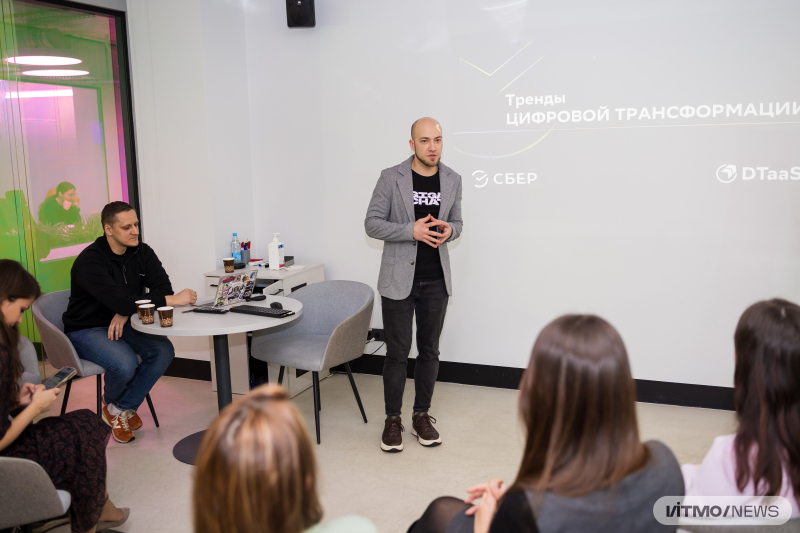
Alexander Matveev, the head of Sberbank’s digital client development department. Photo by Dmitry Grigoryev / ITMO.NEWS
The team that took first place came up with an application that can help foreigners in Russia search for and order various medications. The proposed platform is based on the voice assistant Salute, which would help translate the names of medications from foreign languages into Russian, find their analogs, or select treatments according to the symptoms specified by the user. The same application would also let users order medications from an online pharmacy and receive a physician’s consultation, if needed.
“For us, the most challenging part was reaching a single, coherent solution within the team. We had a lot of ideas, but it wasn’t always easy to objectively assess their feasibility. We were able to solidify our vision once we’d talked to the experts. I believe that the most valuable aspect of such competitions is getting to interact with people with more experience than you, because this way you can greatly advance your knowledge in a limited timeframe. Moreover, it really motivates you to further develop your project,” shares Georgy Aseev, a member of the winning team and a Master’s student at ITMO’s Faculty of Technological Management and Innovations.
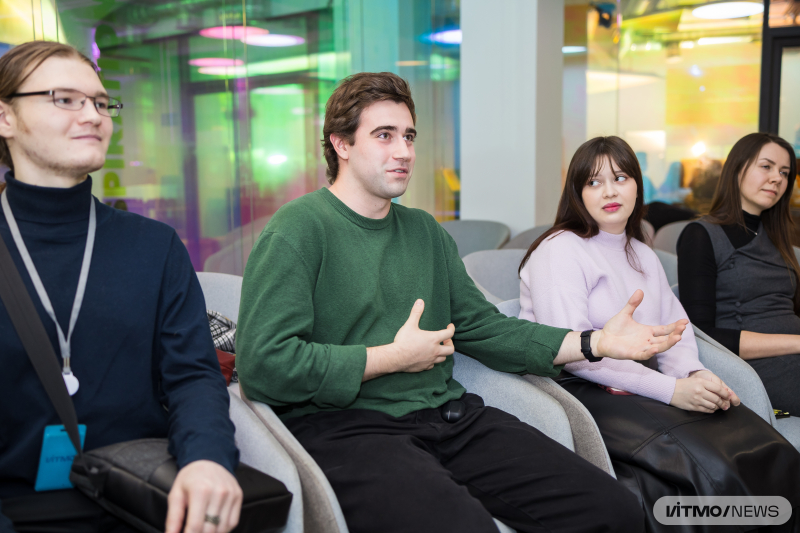
Georgy Aseev, a member of the winning team and a Master’s student at ITMO’s Faculty of Technological Management and Innovations. Photo by Dmitry Grigoryev / ITMO.NEWS
The second place went to a team that proposed an online map service for people with disabilities. According to the team’s vision, the platform would display real-time data about the accessibility of courtyards and streets, as well as the availability of ramps, elevators, and other critical infrastructure elements..
Finally, the third place was shared by two teams. One presented an AI assistant that would help potential investors obtain additional information about residential complexes, such as the proximity of kindergartens and schools, parking availability, dog walking areas, and the overall noise and lighting levels in the area. The other team came up with the idea for a platform based on Sberbank’s Geoanalytics service that would provide up-to-date information on potential locations for those looking to rent an apartment. Within the platform, users will be able to learn about the residential complex and its residents, as well as nearby infrastructure and the accessibility of public transport.
A special prize was awarded to the team that participated in the English-language track. They developed the idea for a service with online maps for ambulance crews. Using this platform, drivers would be able to receive information about traffic jams, adjust their routes, and, in critical situations, control traffic lights, turning the light green for themselves and red for other vehicles. This would help reduce the number of accidents involving ambulances and shorten their arrival time.
This season, the participants also actively utilized AI tools in their project work. The course’s authors plan to enhance the educational program next year with a module on interacting with AI and how to effectively use these technologies when developing educational projects and digital products within the competition.





